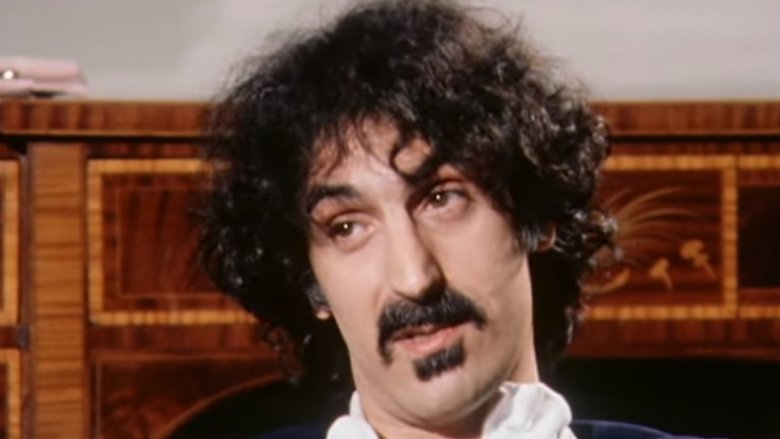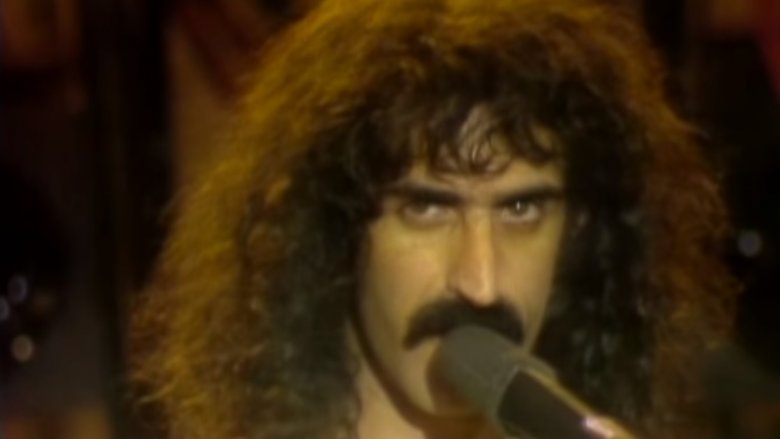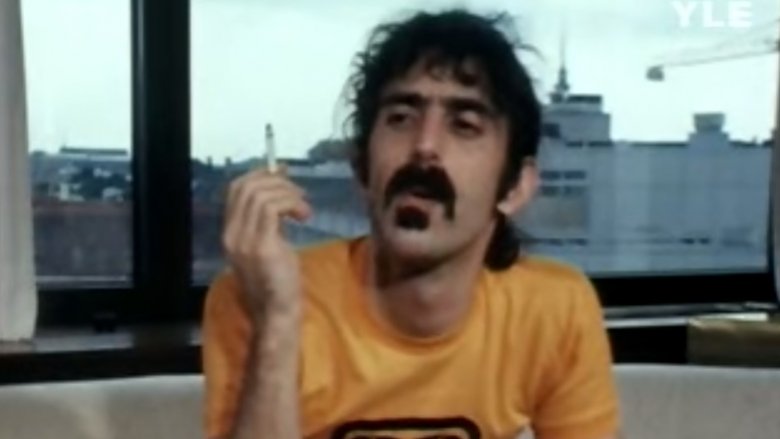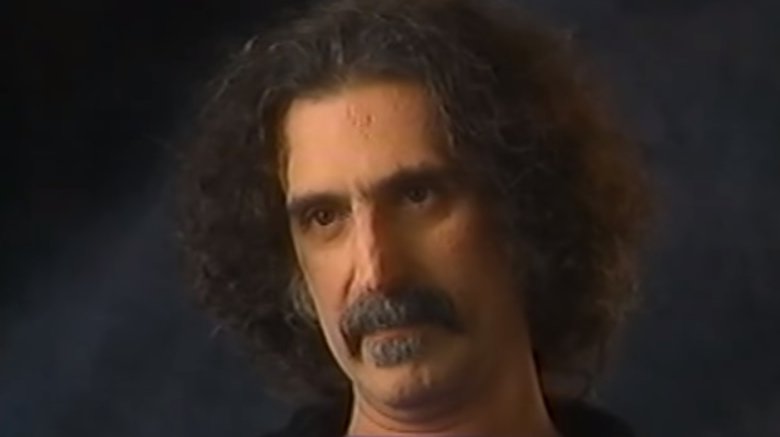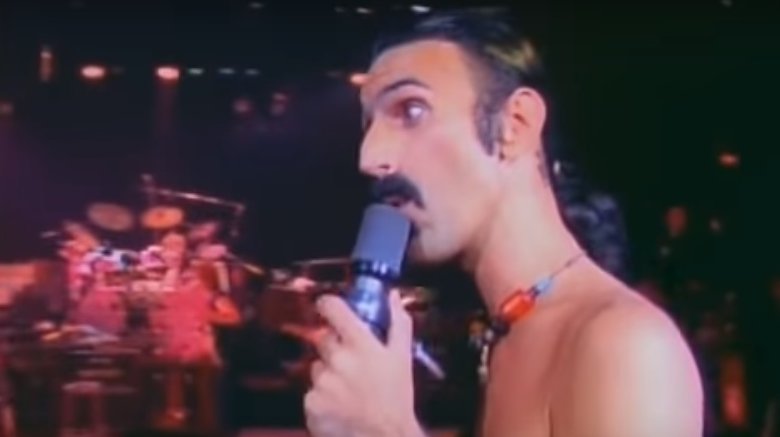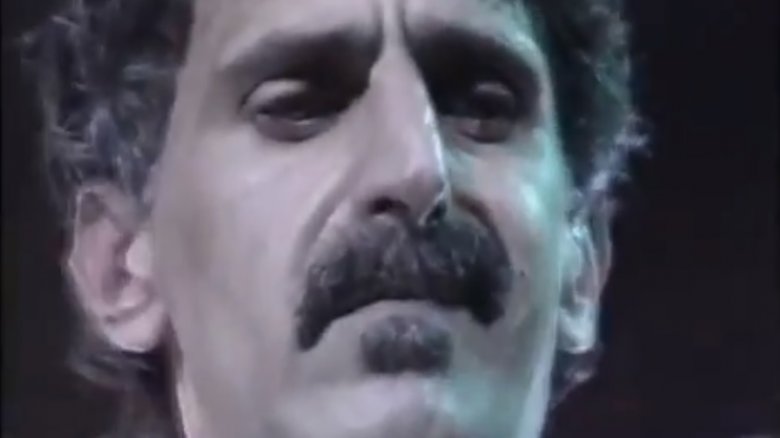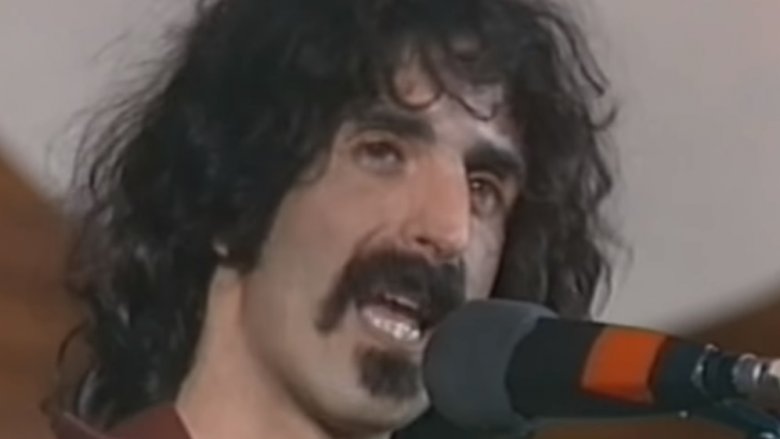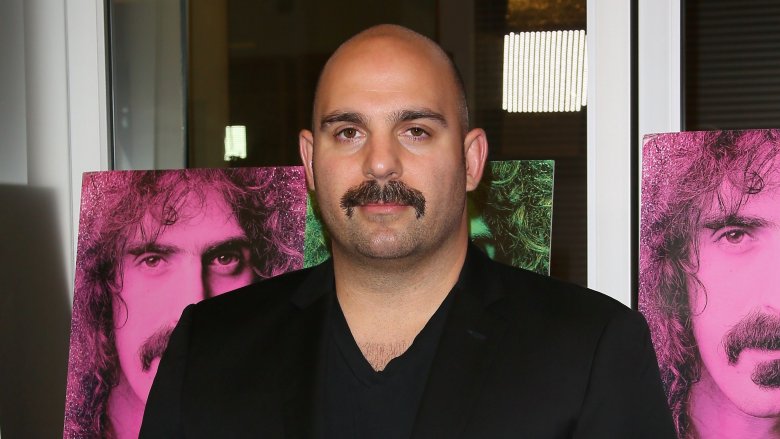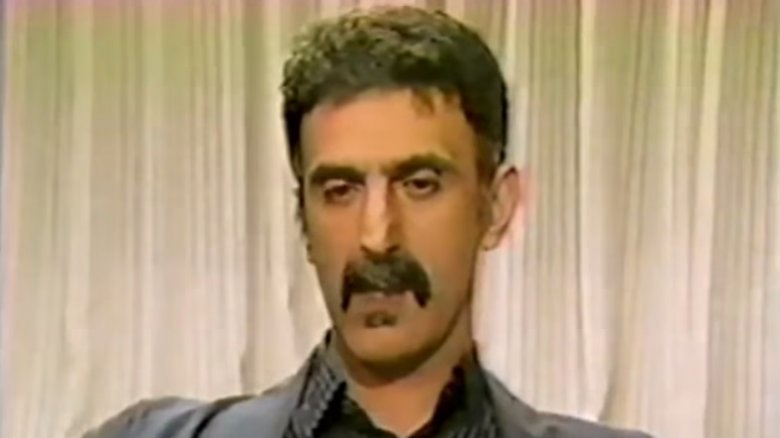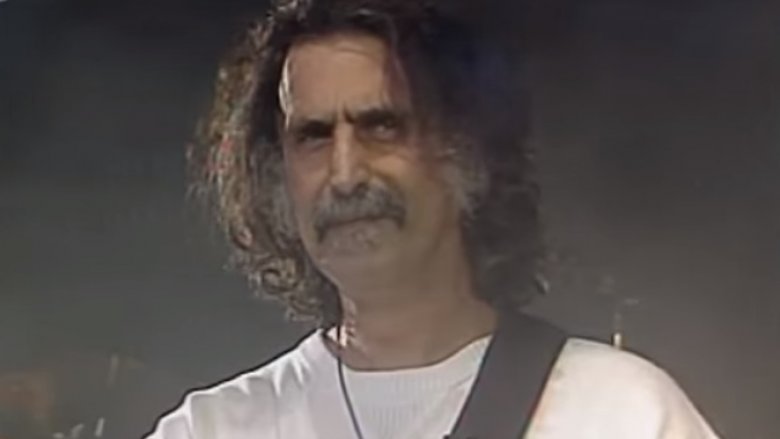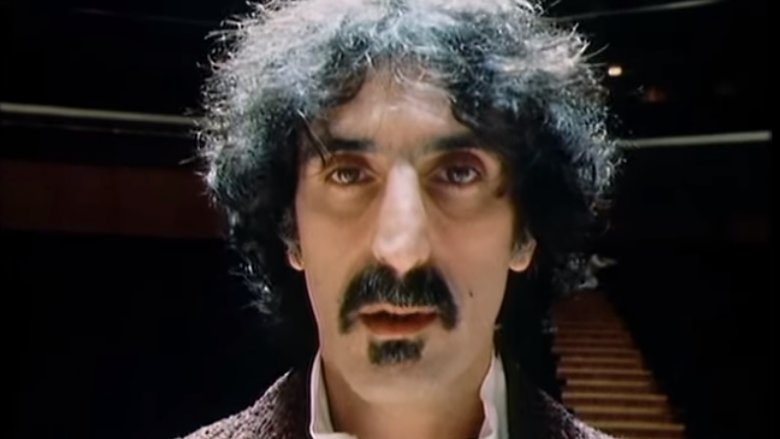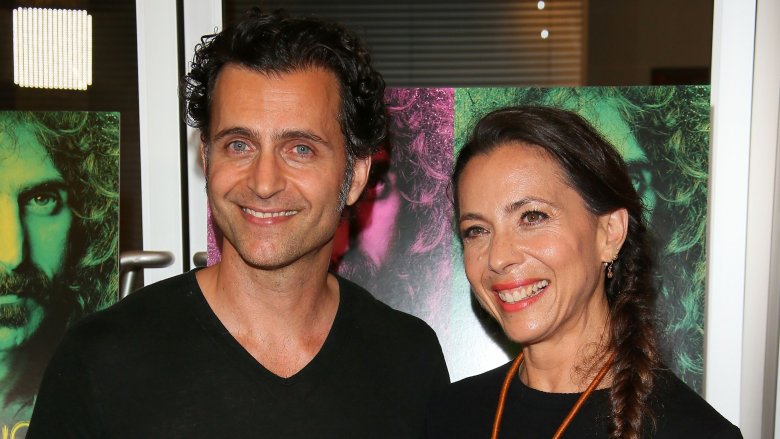Frank Zappa's Tragic Real-Life Story
If you were ever a fan of The Simpsons, you partly have avant-garde rock musician and classical composer Frank Zappa to thank for that. As Simpsons creator Matt Groening explained, "Frank Zappa was my Elvis. His example encouraged me, made me feel it okay to go my own way."
Zappa took creative risks that few musicians would likely consider. When he first appeared on national television in 1963, his performance involved running a violin bow across a bicycle wheel. As the front man of the Mothers of Invention he combined multiple music genres, dizzyingly complex instrumentation, and absurd lyrics in songs like "Montana," which details a man's bizarre ambition to raise "a crop of dental floss." He also wrote experimental classical music and made a surrealist film featuring a rock star puppet that doubles as an adult toy.
Between the 1960s and early 1990s Zappa released more than 60 albums and earned a reputation as an amusing wordsmith, vulgar cultural heretic, and eloquent defender of free speech. Plus, he nearly became a Czech diplomat. But behind Frank Zappa's blistering wit and artistic brilliance was a life marred by illness, upheaval, and dysfunctional relationships. Here's the tragic story of one of music's most unconventional figures.
A biohazardous upbringing
Frank Zappa probably should have spent his childhood in a hazmat suit. His father Francis worked at a military facility that manufactured poisonous gas during World War II. As detailed in The Real Frank Zappa, Francis regularly gave his son lab equipment, including beakers, flasks, and petri dishes full of mercury. These served as Zappa's playthings because his family couldn't afford toys. In fact, Zappa told the Washington Post his "only toy" was a gas mask. He dissected the mask with a can opener.
Growing up, Zappa grappled with asthma, frequent earaches, and sinus trouble. While we can't say for sure, it seems reasonable to speculate that exposure to hazardous substances impacted his health. Inhaling mercury can cause respiratory problems and a host of other issues. According to Zappa, he "lived in mercury." He used to pour it on his bedroom floor and splatter it with a hammer for fun.
Various attempts to cure Zappa were agonizing and misguided. Following Sicilian tradition, his parents poured hot olive oil in his ears to remedy earaches, which in Zappa's words, "hurts like a motherf*er." To address his sinus issues they had a doctor insert radium pellets into his sinus cavities with a long wire. He would suffer for years at the hands of people who were trying to cure him.
From lonely nomad to amateur arsonist
Zappa didn't have a stable home life growing up because his father worked for the Department of Defense. His family moved constantly, hopping from Maryland to Florida to California. Per the New York Times, Zappa attended six different high schools by the time he was 15. Getting uprooted that often isn't conducive to lasting friendships. As Zappa recalled in a Washington Post interview, "I didn't have any friends. I developed an affinity to creeps, and I've surrounded myself with them ever since."
He also had an affinity for classical music and chemistry. As a teen he fell in love with the work of Edward Varese, a classical composer who intentionally wrote inharmonious pieces that were said to be "the ugliest music in the world." In terms of chemistry, well, he liked to blow stuff up. It's unclear if he wanted to be the Edgar Varese of explosives, but his tinkering with volatile substances had ugly results.
In The Real Frank Zappa Book, Zappa described trying to make fireworks using powdered ping-pong balls and other things kids shouldn't play with. Technically, the experiment didn't blow up in his face, but only because the firework exploded next to his groin. Zappa's incendiary antics ended when he nearly got expelled for starting fires all over his San Diego high school with a mixture that contained rocket fuel. After that he stuck to experimenting with music.
He dropped out of college, then failed out of marriage
Frank Zappa and academia didn't see eye-to-eye, but he enrolled in two junior colleges after high school. "I had no interest in higher education," he would later write, but he was very interested in girls and didn't know how else to meet them. However, his academic indifference didn't extend to music.
A mostly self-taught musician, Zappa had been composing music since his senior year of high school and even conducted his school's orchestra. During his one semester at Chaffey Junior College in Alto Loma he took a course on harmony and completely wowed the director Chaffey's music department. As recounted in Electric Don Quixote, Zappa independently studied advanced music books (including a text the director used) and read musical scores. However, college officially outlived its usefulness when Zappa met and fell for Kay Sherman. They quit school, moved in together, and got hitched.
Zappa had a string of mundane jobs that sapped his joy, including working for a greeting card company and selling encyclopedias door-to-door, which he especially despised. On weekends he worked with a lounge band but was mostly confined to playing bland classics like "Happy Birthday," so he quit. Zappa wrote musical scores for low-budget films on the side. Unfortunately for his wife, that wasn't the only type of scoring he did. As the book Tropic of Capricorn described, Zappa got way too friendly with "a buxom redhead named Lorraine Belcher," prompting his wife to divorce him.
An obscene arrest
A vigorous champion of free speech, Zappa refused to call any word obscene. But his longtime secretary Pauline Butcher claimed he made an exception for the word "policeman" for most of his life. While Zappa generally disliked authority, he absolutely detested cops ever since one arrested him. According to Butcher, "Frank described it as the worst experience of his life."
It was 1965, per the Chicago Tribune. Zappa had divorced his first wife and moved into a recording studio in Cucamonga, California. Broke and living on peanut butter sandwiches, he was in no position to turn down money. So when a stranger offered him $100 to make a naughty audiotape, Zappa leaped at the chance and was promptly charged with breaking obscenity laws. The whole thing had been a trap. Because of Zappa's long hair and questionable hygiene, local authorities assumed he was trouble and launched an undercover operation to nab him for something.
In court the judge laughed at the audiotape, which consisted of Zappa and a friend "huffing and puffing, snorting and sighing to evoke a passionate scene." Nonetheless, Zappa spent 10 days behind bars. It was a cockroach-infested hell for Zappa, who found himself trapped with about 40 dudes in temperatures exceeding 100 degrees. The ordeal left him jaded and "ready to flip the bird at the rest of the world."
Do as I say, and I'll hate you, anyway
During the 1960s Zappa gained traction in the music industry with his band, the Mothers of Invention. Their genre-defying songs lampooned every segment of society as hypocritical and shallow, including people who were self-described "freaks" like Zappa. This wasn't just equal-opportunity ridicule. Per the Telegraph, Zappa viewed humanity with contempt and deemed social interactions "a waste of time."
When touring with his bands and orchestras, Zappa stayed in separate, nicer hotels. He looked down on concertgoers because he didn't think they understood his music. In fact, he didn't think most people understood most things. He once told Rolling Stone, "People are stupid. They never stop to question things." Zappa only enjoyed the groupies who slept with him because they provided "a valuable service," and he supported unfettered lust.
Zappa viewed his interactions with people through an imperious lens. He said "his only friends were his family; everyone else just worked for him." He even demanded obedience from crowds. Paste Magazine revealed that in 1978 Zappa ended a show because a single audience member didn't follow his command to sing along. He wasn't much nicer to his "friends." Essentially a loner in his own household, Zappa mostly ignored his kids and buried himself in work. His second wife Gail admitted that the key to preserving their marriage was talking to each other "as little as possible."
Smoke on the water, blood on the concrete
Like any entertainer, Frank Zappa and his Mothers of Invention had their struggles. As All Music described, despite having a devoted fan base, the band usually didn't sell many albums. Through the years, numerous members quit or got replaced. And Zappa, while respected for his ingenuity, was notoriously ornery and domineering and got sued for allegedly screwing bandmates out of royalties. However, the Mothers' ugliest moments were caused by concertgoers.
In 1971 the Mothers toured Europe. During a show in Switzerland someone in the crowd shot off a flare gun. The ensuing fire destroyed the band's instruments and inspired the Deep Purple song "Smoke on the Water." About a week later, the band was performing at the Rainbow Theater in London when 24-year-old Trevor Howell completely lost it. Apparently, Howell's girlfriend had the hots for Zappa, so he charged onto the stage and shoved his perceived rival into the concrete orchestra pit 15 feet below.
Bandmate Mark Volman recalled seeing Zappa's leg "bent underneath him like a Barbie doll" and "blood running from his head to his knees." He sustained multiple broken bones and head injuries, a temporarily paralyzed arm, and a crushed larynx. Per Biography, the incident permanently lowered his voice, and for the rest of his life he would limp and suffer back pain.
Daddy the despot
Frank Zappa was practically allergic to normal people, so he didn't want run-of-the-mill kids. In his view: "The more boring a child is, the more the parents, when showing off the child, receive adulation for being good parents — because they have a tame child-creature in their house." Zappa and his wife Gail would have four children with decidedly un-boring names: Moon Unit, Dweezil, Ahmet (above), and Diva.
In an interview with the Guardian, Ahmet said his first words were "f* you." The Zappa kids were allowed to curse and address their parents as Frank and Gail. Other children envied their expletive-laced freedom. But living under Frank's roof meant you lived on his terms. Since Zappa was nocturnal, "dinner might be pancakes, and breakfast might be beef stroganoff," Ahmet recalled. "It was all tailor-made for him." When Zappa let a groupie move into their basement, everyone had to accept it. Because he disliked driving, Gail had to pick him up from rehearsal in the dead of night, which meant waking the kids to take them with her.
Everything took a backseat to Zappa's music, including his children. His daughter Moon Unit grew so desperate to see him that she wrote him a note proposing that they "get together professionally." They ended up producing the only Top 40 hit of Zappa's career, "Valley Girl." But Moon just "wanted to spend some time with [her] father."
The patron saint of vulgarity
Dirty wordplay, provocative topics, and biting societal commentary were staples of Zappa's songs. Take "Bobby Brown (Goes Down)," for instance, which features a popular guy who nonchalantly considers raping a cheerleader, gets emasculated by a lesbian, and becomes a closeted homosexual, all while referring to himself as "the American dream." Or take "Dinah-Moe Humm," which uses puns and thinly veiled metaphors to describe a man performing carnal acts on two sisters as part of a bet. (Fun fact: Rock legend Tina Turner provided a naughty female voice for the song.)
For Zappa the line between acceptable and obscene lyrics was imaginary. But the freedom to cross that line came under a real threat during the 1980s when Tipper Gore declared war on the music industry. As head of the politically influential Parents' Music Resource Center, Gore pushed for a strict labeling system to single out "offensive" music. Congress held hearings to debate possible legislation, and Zappa along with other musicians testified against it.
Zappa argued that the PMRC's censorship crusade undermined the First Amendment, equating the group's draconian efforts with "treating dandruff by decapitation." Purchasing an artist's album, he said, doesn't "entitle you to a kiss on the foot from the composer or performer in exchange for a spin on the family Victrola," and he declared that "people who write bad laws are, in my opinion, more dangerous than songwriters who celebrate sexuality."
The underground ambassador
Much like his personality, Frank Zappa's music was an acquired taste. Iconic rocker Lou Reed called Zappa "the most untalented bore who ever lived." But countless people in former Soviet states have adored his music for decades. Per the San Diego Union Tribune, in 1995 Lithuania erected a statue in Zappa's honor. And Czech citizens loved him so much that he was briefly appointed as a Czech ambassador.
As Radio Praha explained, when the Czech Republic was still Communist-ruled Czechoslovakia, censors banned Zappa's music. However, dissidents smuggled his albums in the country, and Zappa's name quickly became synonymous with political and intellectual freedom. Kids caught playing heavy rock tunes were reportedly told by police "to turn off that Frank Zappa music."
In 1990 Czech president Vaclav Havel, who later called Zappa "one of the gods of the Czech underground," hosted Zappa in Prague and appointed him as the "Special Ambassador to the West on Trade, Culture and Tourism." However, within weeks the decision was rescinded at the behest of U.S. Secretary of State James Baker, who warned, "You can do business with the United States or you can do business with Frank Zappa."
The intervention was likely payback. James Baker's wife Susan co-founded the Parent's Music Resource Center, which sought to heavily censor music. In 1985 Zappa verbally mauled Susan in front of Congress and even imitated her accent. Apparently her husband got offended.
Goodnight, suite prince
Frank Zappa is often remembered as an exceptional rock musician, but as biographer Barry Miles pointed out, Zappa "began life writing classical music. He didn't actually write his first rock and roll song until he was 21, whereas he'd been writing classical music since he was 16." His life would also end with classical music.
In 1990 Zappa was diagnosed with prostate cancer. He had known something was wrong with him for years, but doctors repeatedly failed to spot a problem. When they finally discovered the tumor in his prostate, it was already inoperable and completely hindered his ability to pee. "In order for me to survive, they had to poke a hole in my bladder," Zappa recalled. "I spent more than a year with a hose coming out of my bladder and a bag tied to my leg."
Treatments initially shrank the tumor, but it eventually became untreatable. As Zappa deteriorated he willed himself to create music, devoting his final years to classical works, per All Music. In 1993 he released The Yellow Shark, an orchestral album that famed musician Tom Waits hailed as "a rich pageant of texture in color" and "the clarity of [Zappa's] perfect madness." A few weeks after releasing The Yellow Shark, Zappa died. He was 52.
Clash of the Zappas
Although Frank Zappa loved music, he considered the music industry a "cynical commercial exercise," according to the Telegraph. Understandably, before he died he instructed his wife Gail to "sell everything and get out of this horrible business." However, Gail did the opposite, becoming what Rolling Stone described as "the exacting, often litigious gatekeeper of the Zappa family business." She demanded royalties from anyone who played Frank's music publicly and sent cease-and-desist letters to cover bands, accusing them of "identity theft." She even tried to sue a German tribute festival for using a logo fashioned after Frank's facial hair.
Gail's overprotectiveness of her husband's legacy didn't end with her. Before dying of lung cancer in 2015 she arranged to have Frank's estate unequally divided among their four children based on who she thought was most capable of managing it. Ahmet and Diva each inherited 30 percent of the Zappa Family Trust while Dweezil and Moon (pictured above) each received only 20 percent. As a result, Dweezil and Moon need permission from their two younger siblings to profit from their father's music or likeness.
At one point, Dweezil, a professional musician who frequently covers his father's songs, actually received a cease-and-desist letter for using the name Zappa Plays Zappa. To avoid a lawsuit, he ditched the merch and renamed his show "50 Years of Frank: Dweezil Zappa Plays Whatever the F* He Wants –- The Cease and Desist Tour." On the bright side, that's a much better name.
